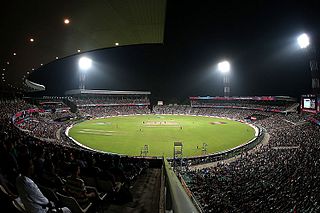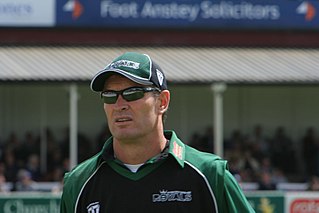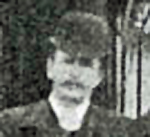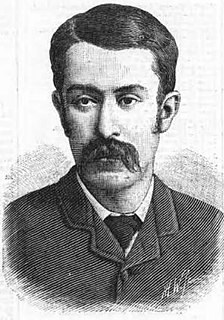This article does not cite any sources .(August 2019) (Learn how and when to remove this template message) |
A benefit season is a method of financially rewarding professional cricketers that is used by English county cricket teams to compensate long serving players.

Cricket is a bat-and-ball game played between two teams of eleven players on a field at the centre of which is a 20-metre (22-yard) pitch with a wicket at each end, each comprising two bails balanced on three stumps. The batting side scores runs by striking the ball bowled at the wicket with the bat, while the bowling and fielding side tries to prevent this and dismiss each player. Means of dismissal include being bowled, when the ball hits the stumps and dislodges the bails, and by the fielding side catching the ball after it is hit by the bat, but before it hits the ground. When ten players have been dismissed, the innings ends and the teams swap roles. The game is adjudicated by two umpires, aided by a third umpire and match referee in international matches. They communicate with two off-field scorers who record the match's statistical information.

Inter-county cricket matches are known to have been played since the early 18th century, involving teams that are representative of the historic counties of England and Wales. Since the late 19th century, there have been two county championship competitions played at different levels: the County Championship, a first-class competition which currently involves eighteen first-class county clubs among which seventeen are English and one is from Wales; and the Minor Counties Championship, which currently involves nineteen English county clubs and one club that represents several Welsh counties.
The system originated in the 19th century to help out professional cricketers who were paid low wages and generally could not play professional cricket much beyond the age of forty. Early "benefits" typically comprised the gate receipts of a designated match. Nowadays, a benefit season comprises a sequence of events such as dinners and auctions of memorabilia over the course of the summer cricket season or the whole year in which the relevant cricket season falls. In almost all cases only one player from a club is given a benefit in each season in order to avoid two or more players competing to attract money from the same people. Until recently, players with less service might sometimes be given a "Testimonial" season or match: the difference appears to have been largely semantic, but for almost half a century one of the less financially sound English first-class county clubs, Derbyshire, made a point of not awarding benefits, but giving testimonials instead. The Australian cricketer Colin McCool was awarded a testimonial in 1959, only three years after joining Somerset. [1]

Colin Leslie McCool was an Australian cricketer who played in 14 Tests from 1946 to 1950. McCool, born in Paddington, New South Wales, was an all-rounder who bowled leg spin and googlies with a round arm action and as a lower order batsman was regarded as effective square of the wicket and against spin bowling. He made his Test début against New Zealand in 1946, taking a wicket with his second delivery. He was part of Donald Bradman's Invincibles team that toured England in 1948 but injury saw him miss selection in any of the Test matches.

Somerset County Cricket Club is one of eighteen first-class county clubs within the domestic cricket structure of England and Wales. It represents the historic county of Somerset. Founded in 1875, Somerset was initially regarded as a minor county until official first-class status was gained in 1895. Somerset has competed in the County Championship since 1891 and has subsequently played in every top-level domestic cricket competition in England. The club's limited overs team was formerly named the Somerset Sabres, but is now known only as Somerset.
The player will appoint a "benefit" committee to help him organise his benefit, composed of other current and former cricketers, and any business and professional people with relevant skills and contacts who are willing to help out. All the profits go to the player and they are exempt from tax following the ruling of the House of Lords over the benefit for James Seymour, the Kent cricketer whose benefit in 1920 was the subject of a protracted legal case brought by the Inland Revenue and not fully resolved until 1926.

The House of Lords, also known as the House of Peers, is the upper house of the Parliament of the United Kingdom. Membership is granted by appointment or else by heredity or official function. Like the House of Commons, it meets in the Palace of Westminster. Officially, the full name of the house is the Right Honourable the Lords Spiritual and Temporal of the United Kingdom of Great Britain and Northern Ireland in Parliament assembled.
James Seymour was an English professional cricketer who played primarily for Kent County Cricket Club in the early years of the 20th century. Seymour made 553 first-class cricket appearances in a career that lasted from 1900 until 1926, scoring over 27,000 runs in his career.

Kent County Cricket Club is one of the eighteen first-class county clubs within the domestic cricket structure of England and Wales. It represents the historic county of Kent. The club was first founded in 1842 but teams representing the county have played top-class cricket since the early 18th century and the club has always held first-class status. Kent have competed in the County Championship since the official start of the competition in 1890 and have played in every top-level domestic cricket competition in England. The club's limited overs team is called the Kent Spitfires after the Supermarine Spitfire.
A player may be rewarded with a benefit season by his county committee about ten years after receiving his county cap, but this varies from player to player, partly because in order for his benefit to qualify for tax exemption a player must not have had a contractual expectation of a benefit. Occasionally a player stays with a county long enough to be awarded a second benefit. Sometimes this is also known as a "testimonial": an example is Graham Gooch of Essex who had a benefit in 1985 and a testimonial in 1995.

Graham Alan Gooch, is a former English first-class cricketer who captained Essex and England. He was one of the most successful international batsmen of his generation, and through a career spanning from 1973 until 2000, he became the most prolific run scorer of all time, with 67,057 runs across first-class and limited-overs games. His List A cricket tally of 22,211 runs is also a record. He is one of only twenty-five players to have scored over 100 first-class centuries.

Essex County Cricket Club is one of eighteen first-class county clubs within the domestic cricket structure of England and Wales. It represents the historic county of Essex. Founded in 1876, the club had minor county status until 1894 when it was promoted to first-class status pending its entry into the County Championship in 1895, since when the team has played in every top-level domestic cricket competition in England. Essex play most of their home games at the County Cricket Ground, Chelmsford and some at Lower Castle Park in Colchester. The club has formerly used other venues throughout the county including Valentines Park in Ilford, Leyton Cricket Ground, the Gidea Park Sports Ground in Romford, and Garon Park and Southchurch Park, both in Southend. Its limited overs team is called the Essex Eagles, whose team colours are all-blue.
The system has survived into the 21st century even though county cricketers are now reasonably well paid. The amounts raised generally vary from a few tens of thousands of pounds to low six figures. A few players (such as Graeme Hick ) have made over three hundred thousand pounds. The amount that a player makes from his benefit depends on factors such as his personal popularity, contacts, social skills and fame at least as much as on his degree of financial need and the quality of his contribution to his club on the pitch. One aspect of this which attracts particular scepticism is that famous international cricketers, some of whom will retire as millionaires in any case, tend to make more out of their benefit season than less well off players who have never played for their country, and who seem closer to the being the kind of "deserving cause" for whom benefits were first devised. The supporters of the system contend that it brings about two million pounds a year into the English game which would otherwise be lost if the system were to be abandoned.

Graeme Ashley Hick is a former English cricketer who played 65 Test matches and 120 One Day Internationals for England. He was born in Rhodesia, and as a young man played international cricket for Zimbabwe. He played English county cricket for Worcestershire for his entire English domestic career, a period of well over twenty years, and in 2008 surpassed Graham Gooch's record for the most matches in all forms of the game combined.
In the game of cricket, the cricket pitch consists of the central strip of the cricket field between the wickets. It is 22 yards long and 10 feet wide. The surface is flat and normally covered with extremely short grass though this grass is soon removed by wear at the ends of the pitch.
Since the 1990s the proportion of cricketers who move from one county club to another during their playing career has been rising sharply, and many players who do so never receive a benefit. However, salaries have risen sharply in recent years, and many players prefer to hunt for a better salary rather than stay where they are in the hope of being awarded a benefit at some point. A conventional pension scheme for cricketers has also been introduced to complement the benefit system.
If a county has no player in its squad who is eligible for a benefit but has not yet had one, it may organise a "county benefit" or a "youth cricket benefit" to raise funds for special projects, but these often do not raise much money as many people are more interested in taking part in a benefit if they know that they are helping an individual.
Tax exempt events to raise money for long serving players are also used in some other sports such as football, although they tend to be called testimonials in that case and are usually a single match rather than a season of events. The tax free status of benefits and testimonials rests on a single early 20th century legal ruling, and great care has to be taken by every benefit committee not to breach the rules in some small way which might lead to the player receiving a demand for tax on the entire amount, or to provoke the Inland Revenue into challenging the exemption on an overall basis. However, testimonials for prominent professional footballers have in modern times increasingly become charity fundraisers in which the player donates either a large part or all of the proceeds to one or more organisations.
A testimonial match or testimonial game, often referred to simply as a testimonial, is a practice in some sports, particularly in association football in the United Kingdom and South America, where a club has a match to honour a player for service to the club. These matches are always non-competitive.

The Inland Revenue was, until April 2005, a department of the British Government responsible for the collection of direct taxation, including income tax, national insurance contributions, capital gains tax, inheritance tax, corporation tax, petroleum revenue tax and stamp duty. More recently, the Inland Revenue also administered the Tax Credits schemes, whereby monies, such as Working Tax Credit (WTC) and Child Tax Credit (CTC), are paid by the Government into a recipient's bank account or as part of their wages. The Inland Revenue was also responsible for the payment of child benefit.











